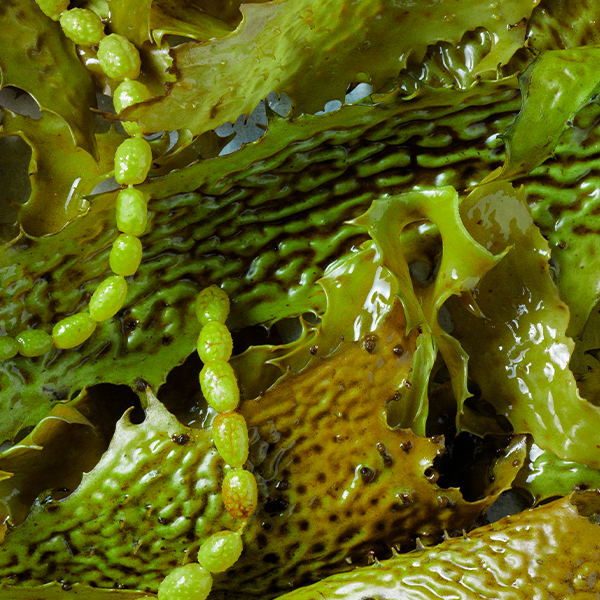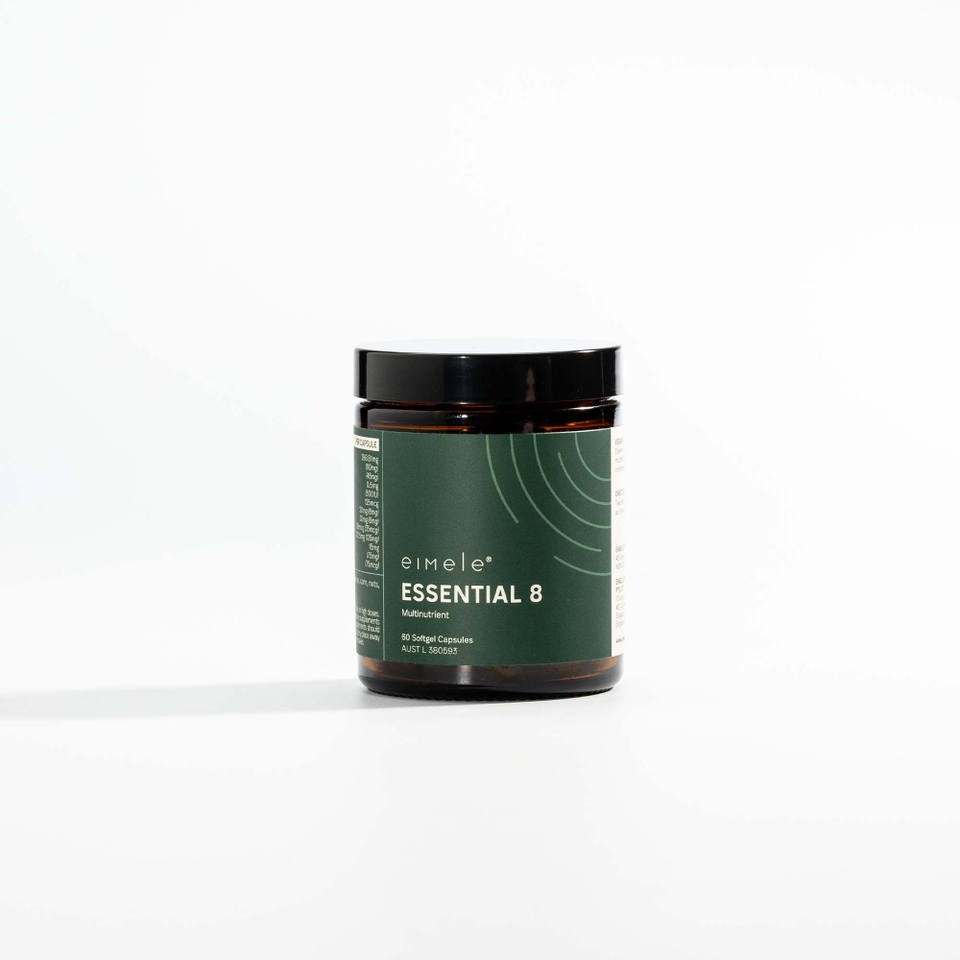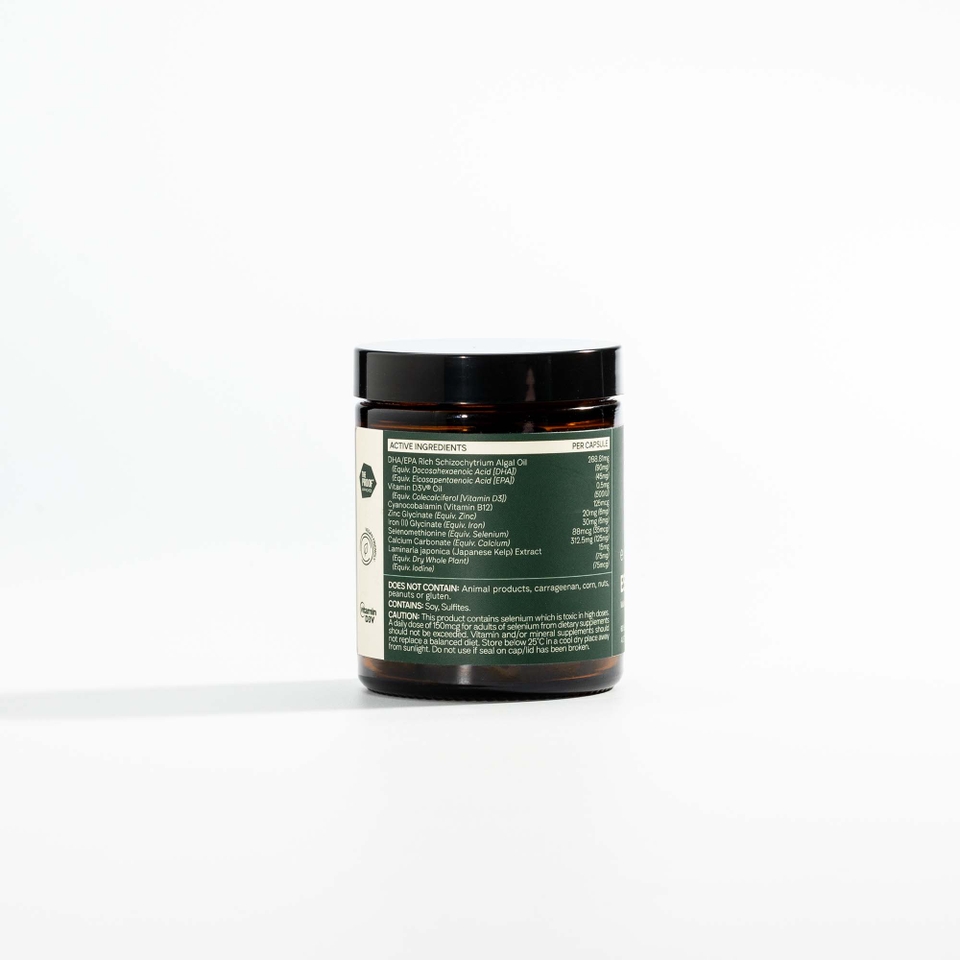
omega-3
What is omega-3?
Omega-3 is a type of polyunsaturated, essential fatty acid. Being essential refers to the need for this type of fat to be regularly replaced through the diet as the body cannot make it's own.
Two essential omega-3 fatty acids are particularly important - eicosapentaenoic acid and docosahexaenoic acid, or EPA and DHA for short. The bulk of the scientific evidence behind why omega-3 fats are so beneficial to health lies with the EPA and DHA components.
Why is omega-3 so important?
Omega-3 essential fats make up the bulk of every single cell membrane. Without omega-3 fats, cells wouldn’t be able to function properly.[1]
The brain needs adequate amounts of omega-3 for healthy cognitive function. In fact, higher omega-3 levels are associated with better cognitive performance.[2]
During foetal development and into adolescence, omega-3 fats are needed in higher quantities to support the needs of the developing brain, eyes and nervous system.[3,4]
Omega-3 fatty acids can also be beneficial to heart health. They have been shown to lower triglyceride levels while also increasing the protective “good” cholesterol known as high-density lipoprotein (HDL).[5]
The source
Our omega-3 is sourced from 100% fermented, non-GMO algae with zero impact on the marine ecosystem. Algae oil is a plant-derived source of EPA and DHA which also contains other beneficial fatty acids.
Is algae a good source of omega-3? Microalgal oil supplements have been shown to increase omega-3 levels in the blood. This source is therefore considered to be an effective replacement for standard fish oil supplements.[6]
Optimal dosage
There is no upper-level intake set for omega-3 fatty acids. This means that there are no known adverse effects from consuming too much omega-3.[7] Aiming higher than the recommended daily intake (RDI) may be beneficial in maintaining overall health and wellbeing, as well as supporting brain and cardiovascular function.
RDI for omega-3
- Men 19+ years 160mg/day
- Women 19+ years 90mg/day
- Pregnancy 115mg/day
- Lactation 145mg/day
Why do you need to supplement omega-3?
As an essential fat, omega-3 needs to be replaced regularly through diet. Unfortunately, the modern diet is not only low in beneficial omega-3 fat, but it’s also high in
inflammation-causing omega-6 fatty acids. Therefore, the need to ensure we get plenty of omega-3 fats in our diet is even greater than ever before.[8]
Interesting facts about omega-3
- Omega-3 fatty acids are famously found in deep-sea cold-water fish like salmon. Interestingly though, these fish obtain their omega-3 from microalgae[9] - so why not get it directly from the source?
- You might be wondering about other plant sources of omega-3 fats. Alpha-linolenic acid (ALA) is a type of essential fatty acid found in plant foods such as chia, flaxseed and walnuts. While ALA can usually be converted in the body to EPA and DHA, a number of competing factors mean that the conversion rate is very low.[10]
References:
[1]. Harvard School of Public Health. Omega-3 fatty acids: an essential contribution. N.d., accessed July 2022 from https://www.hsph.harvard.edu/nutritionsource/what-should-you-eat/fats-and-cholesterol/types-of-fat/omega-3-fats/
[2]. Barnes, S., Chowdhury, S., Gatto, N.M., Fraser, G.E. & Lee, G.J. (2021). Omega-3 fatty acids are associated with blood-brain barrier integrity in a healthy aging population. Brain and Behaviour, 11(8):e2273.
[3]. Coletta, J.M., Bell, S.J. & Roman, A.S. (2010). Omega-3 fatty acids and pregnancy. Obstetrics & Gynecology, 3(4):163-171.
[4]. Echeverría González, F. & Valenzuela Baex, R. (2017). In time: Importance of omega 3 in children’s nutrition. Rev Paul Pediatr, 35(1):3-4.
[5]. Chaddha, A. & Eagle, K.A. (2015). Omega-3 fatty acids and heart health. Circulation, 132(22):e350-e352.
[6]. Lane, K.E., Wilson, M., Hellon, T.G. & Davies, I.G. (2022). Bioavailability and conversion of plant based sources of omega-3 fatty acids - a scoping review to update supplementation options for vegetarians and vegans. Crit Rev Food Sci Nutr, 62(18):4982-4997.
[7]. NHMRC. Fats: Total fat & fatty acids. Updated April 2014, accessed July 2022 from https://www.nrv.gov.au/nutrients/fats-total-fat-fatty-acids
[8]. Innes, J.K. & Calder, P.C. (2018). Omega-6 fatty acids and inflammation. Prostaglandins, Leukotrienes and Essential Fatty Acids, 132:41-48.
[9]. CSIRO. Sustainable production of omega-3 oils - microalgae offer us a direct and sustainable source of omega-3 oils. Updated January 2021, accessed July 2022 from https://www.csiro.au/en/research/plants/crops/oil-crops/algae-omega3s
[10]. Burdge, G.C. (2006). Metabolism of alpha-linolenic acid in humans. Prostaglandins Leukot Essent Fatty Acids, 75(3):161-8.



